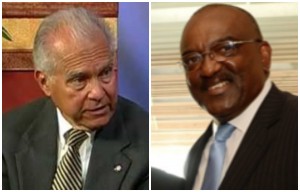An attempt to ground the long-delayed Airport City project at Miami International Airport failed Wednesday after  commissioners tied in a vote that asked the administration to come up with a list of alternative uses in 60 days.
commissioners tied in a vote that asked the administration to come up with a list of alternative uses in 60 days.
But the true, deep, dark motivation for the motion — made by Commission Esteban Bovo, who originally wanted to toss out negotiations with Odebrecht USA altogether and start anew — reared its ugly head when Commissioner Javier Souto basically said Cuban Americans had built Miami and that they should be respected.
See? Odebrecht USA is a subsidiary of the Brazil-based parent company that does business in Cuba and won the chance in a competitive process in 2010 to lease parcels at Miami International Airport to develop a hotel, restaurants and shops, as well as possibly a gas station, dry cleaner and pet hotel/kennel.
And Bovo can talk blue in the face about the negotiations starting four years ago on a plan that was conceived in 2008 in a bigger footprint than what is available now in a different economic climate where we can get better terms today, yadda yadda — the real problem here is the firm’s ties with Cuba.
Even they know that. Even Pedro Munilla of MCM Construction — which came in number two for Airport City negotiations — and his lobbyist Armando Gutierrez, who were in the chambers nodding their heads in agreement as Souto spoke, know that.
Related related content: Delayed Airport City project battle brews at Miami-Dade
“The issue is not the company in itself,” Souto began to say in one of those long-winded, twisted monologues that clearly show, no matter how much you like him, that the former Senator’s time on the dais is done. “The issue is what decisions the company has made in the last years that really bothers and goes to the heart of this community.

“It really bothers and hurts a lot of people,” Souto said, ignoring the instructions of the county attorney’s office that this secret underlying motivation was not to be openly discussed, since the Supreme Court ruled that this can’t be a local issue. “Over 65% of the people here are Latin. Out of the Latin people, the prevalent community is the Cuban community. If you don’t know that, you don’t know where you are.
“We don’t need anymore exacerbation of feelings. We shouldn’t fool around and play around with the feelings of the community,” Souto said, then preceded to play around with the feelings of part of the community by saying, basically, that people forgot Miami was un campo 56 years ago, before the Cubans got here en masse.
“What was Miami? And what is Miami today? It is because of the Cubans who came here,” Souto said, ignoring several attempts by Chairwoman Rebeca Sosa — who could see the downward spiral — to interrupt him.
But it was too late. El gato was out of the bag.
“Black folks built this community,” Commissioner Dennis Moss shot back.
“I resent that,” Moss said. “We have a diverse community. Everybody plays a role in the community. Everybody pays taxes… To have this attitude that ‘I control everything,’ to me, is offensive.
“At the end of the day, that’s part of what’s wrong with Miami-Dade County,” Moss said. “It’s not about being fair. It’s about power.”
Moss had wanted to present another, way different resolution that would have asked the mayor to move forward with the finalization of negotiations with Odebrecht. He was denied the ability to make that motion by Bovo calling the four-day rule, which requires resolutions to be part of the public agenda for at least four days.
Earlier, Moss had pointed out that Odebrecht had not violated any laws or rules and that the county was ready to move forward because, an assistant county attorney answered him, the lease agreement was “substantially completed” and just needed minor language clean up.
The commissioner also brought up the 305 Pizza debacle — another county bid process that went awry after the county decided, nah, we don’t want to offer that area of the airport — and said that this is no way to do business.
“We said never mind,” Moss said. “And now we’re trying to say never mind again. What kind of message are we sending to the business community?”

Sosa, when she wasn’t trying to smooth out the ethnic ripples, seemed to be selling the idea of starting over — or at least delaying the current negotiations with a new set of parameters. “It was the former manager that started this process seven or eight years ago,” Sosa said, repeating what was apparently one of the message points: That this is an old deal.
“I don’t think we’ve ever had a procurement process that has taken eight years to get,” she said, adding that she wanted a traffic study to see how the development might affect nearby neighborhoods “after soooooooo many years.” Her dramatic flair. Not mine.
“We can sit here and say it started before the mayor,” said Commissioner Barbara Jordan, who should have listed all the things that the county is still working on that started before the mayor. “But we did this,” she reminded her colleagues, because the directive to start negotiating for uses that would bring MIA revenue was discussed and approved by the commission.
“I hate to think that the slowdown is political,” Jordan said, hitting the nail on the head.
Indeed, Moss asked about negotiations that were begun around the same time to develop parcels at Tamiami Kendall Executive Airport. While those talks are finished, the county is “not ready to move forward at this time,” staff told him. Wonder what the hold up is over there.
Bovo continued to insist that the rationale for his resolution was to get a bigger, better deal. “They offered us more money because there are other offers out there,” he said, referring to a re-negotiation that got the county $15 million more.
He said Airport City no longer exists because it has been scaled back so much. He called it “Airport Neighborhood.”
“I’m willing to wait a year or two or three or four, whatever it takes,” he said, about getting a better deal. Because staff had already told commissioners it would take about three to four years to negotiate a new agreement.
Meanwhile, Odebrecht is ready to go. Ladra was told they can break ground in August.
That is, if the community doesn’t blow up with this ugly us versus them, Cuban versus black thing. Again.
Commissioner Xavier “Mayor Sir” Suarez maybe saw the writing on the wall and became nearly overwrought with emotion. The first Cuban-American mayor of Miami — the one who took the streets during the Arthur MacDuffie riots — expressed a deep disappointment in the ethnic split that came up and said that he never would have been elected without the support of the black community. He said he “loved” the former senator and got along well with Moss and did not like to see this ugly dispute. He seemed to choke back tears.
But when it came time to vote, Suarez was among those who voted against Bovo’s Cuba-tainted measure, despite Souto’s pleas. With him: Commissioners Jordan, Moss, Jean Monestime, Audrey Edmonson and Bruno Barreiro, who amazed many when he broke from the Munilla/Gutierrez chains to vote, technically, against them.
Those who voted for the resolution with Bovo were Sosa, Souto, Vice Chair Lynda Bell, and Commissioners Jose “Pepe” Diaz and Sally Heyman.
Commissioner Juan Zapata was absent for the vote. He had to leave early because he had a family medical emergency. But despite the fact that he voted with Bovo in the finance committee — after first amending the resolution so it would not scrap the plan entirely — Zap likely would have made the vote 7-6 against requesting a fresh look at the project.
Earlier in the meeting, Zapata asked about a $4 million expenditure for police vehicles that was on the agenda. Most of it was for Ford vehicles for patrol cars but some of the funds were going to Pembroke Motors in Pembroke Pines and Zapata asked what model vehicle that was for. Dodge, he was told.
“Chrysler,” he asked, just to be sure.
Yes, he was told.
“Yeah, Fiat,” he said, sorta under his breath, referring to the car company that last year secured full ownership of Chrysler.
And that has dealerships in Cuba.

